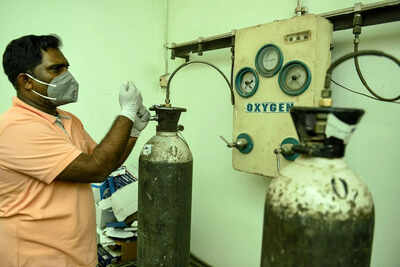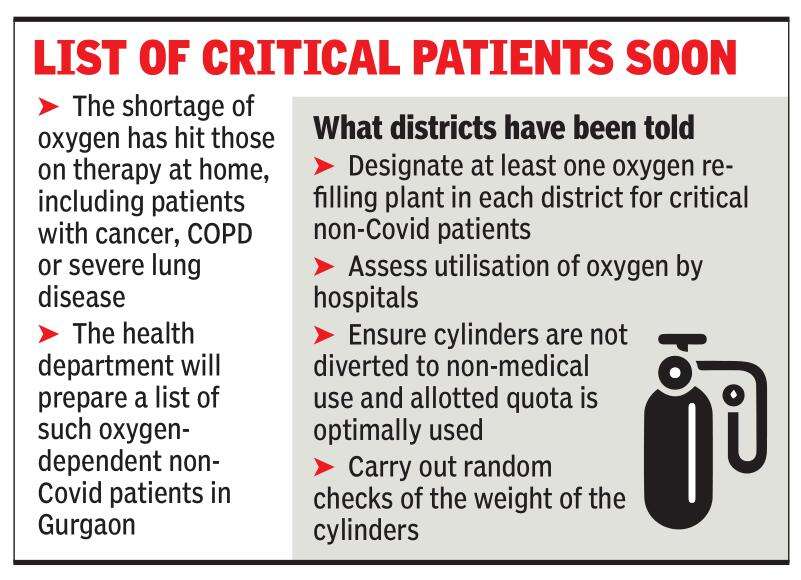- News
- City News
- gurgaon News
- Gurugram: Oxygen crisis also a nightmare for non-Covid patients
Gurugram: Oxygen crisis also a nightmare for non-Covid patients

A worker adjusts oxygen cylinders at a hospital in Gurugram. (PTI photo)
GURUGRAM: The difficulty in procuring an oxygen cylinder has affected scores of people who are not infected by the novel coronavirus but are on oxygen therapy at home.
They include cancer patients and those with severe obstructive pulmonary disease and severe lung disease.

Oxygen support is crucial for them and the crisis that has disrupted usual supply lines is giving their families sleepless nights.
Families of these patients have pointed out that they have been standing in long queues to get cylinders refilled, only to find that Covid hospitals are being given priority.
The city has five refilling stations — Max Air, Star Oxygen, GK Papreja, SK Gases and Kalinga. These units are now being controlled by the drug controller, and thus getting cylinders refilled has become difficult for individuals.
“I have been trying to get my cylinder filled for the past four days. I am not sure if I will get any help,” said a worried Anil Shah, whose father is suffering from chronic lung disease.
Like Shah, there are several other people waiting for refills.
They are being asked to produce documents as proof of their requirement for oxygen, as well as verification letters issued by the district administration
. “The entire process is time-consuming. People have to fill forms and wait for verification. My critically-ill mother, who is 70 years old, needs oxygen therapy daily. I don’t know where to go for verification,” said Shekhar Gulati, a resident of Sector 71.
The health department has now decided to prepare a list of oxygen-dependent non-Covid patients and designate at least one refiller in the district to serve them.
“People who are suffering from chronic illnesses and require oxygen should come to refilling stations with their documents. They will be allowed to refill oxygen,” said Dr Virender Yadav, chief medical officer, Gurgaon.
Meanwhile, Haryana additional chief secretary (health) Rajeev Arora has issued an order to all deputy commissioners and civil surgeons in the state to assess the utilisation of oxygen by hospitals.
“It is expected that cylinders are not diverted to non-medical use and allotted quota is optimally used as per guidelines. This audit will also cover government facilities like community health centres,” he said.
Random checks of the weight of the cylinders will be carried out to ensure that there is no diversion of oxygen, he further said.
City has been allotted 40 metric tonnes of oxygen daily whereas its demand stands at 55 metric tonnes, leading to a substantial gap between demand and supply.
They include cancer patients and those with severe obstructive pulmonary disease and severe lung disease.

Oxygen support is crucial for them and the crisis that has disrupted usual supply lines is giving their families sleepless nights.
Families of these patients have pointed out that they have been standing in long queues to get cylinders refilled, only to find that Covid hospitals are being given priority.
The city has five refilling stations — Max Air, Star Oxygen, GK Papreja, SK Gases and Kalinga. These units are now being controlled by the drug controller, and thus getting cylinders refilled has become difficult for individuals.
“I have been trying to get my cylinder filled for the past four days. I am not sure if I will get any help,” said a worried Anil Shah, whose father is suffering from chronic lung disease.
Like Shah, there are several other people waiting for refills.
They are being asked to produce documents as proof of their requirement for oxygen, as well as verification letters issued by the district administration
. “The entire process is time-consuming. People have to fill forms and wait for verification. My critically-ill mother, who is 70 years old, needs oxygen therapy daily. I don’t know where to go for verification,” said Shekhar Gulati, a resident of Sector 71.
The health department has now decided to prepare a list of oxygen-dependent non-Covid patients and designate at least one refiller in the district to serve them.
“People who are suffering from chronic illnesses and require oxygen should come to refilling stations with their documents. They will be allowed to refill oxygen,” said Dr Virender Yadav, chief medical officer, Gurgaon.
Meanwhile, Haryana additional chief secretary (health) Rajeev Arora has issued an order to all deputy commissioners and civil surgeons in the state to assess the utilisation of oxygen by hospitals.
“It is expected that cylinders are not diverted to non-medical use and allotted quota is optimally used as per guidelines. This audit will also cover government facilities like community health centres,” he said.
Random checks of the weight of the cylinders will be carried out to ensure that there is no diversion of oxygen, he further said.
City has been allotted 40 metric tonnes of oxygen daily whereas its demand stands at 55 metric tonnes, leading to a substantial gap between demand and supply.
FacebookTwitterLinkedinEMail
Start a Conversation
end of article
Trending Topics
Top Stories Right Now
- indiaCovid live: Prepare for the third wave, Supreme Court tells Centre
- cityLive: Kejriwal thanks PM, says Delhi received 730MT of oxygen for first time
- cityKerala model: How the state got more out of its Covid-19 vaccine vials
- cityCovid-19: Second wave claims more kids, hospitalisation rate 1.5 times higher th...
- city3 lakh Bengaluru active cases highest among all cities in both waves
Quick Links
Delhi Air PollutionDelhi TemperatureChennai WeatherBangalore TemperatureCovid vaccination centres in DelhiCoronavirus in DelhiRTPCR test in GurgaonHyderabad RainPollution level in BangaloreDelhi SmogDelhi TemperatureNoida AQIGurgaon AQI todayFire in MumbaiMumbai RainsCovid 19 RT PCR Test in NoidaDelhi AQI todaySrinagar encounter